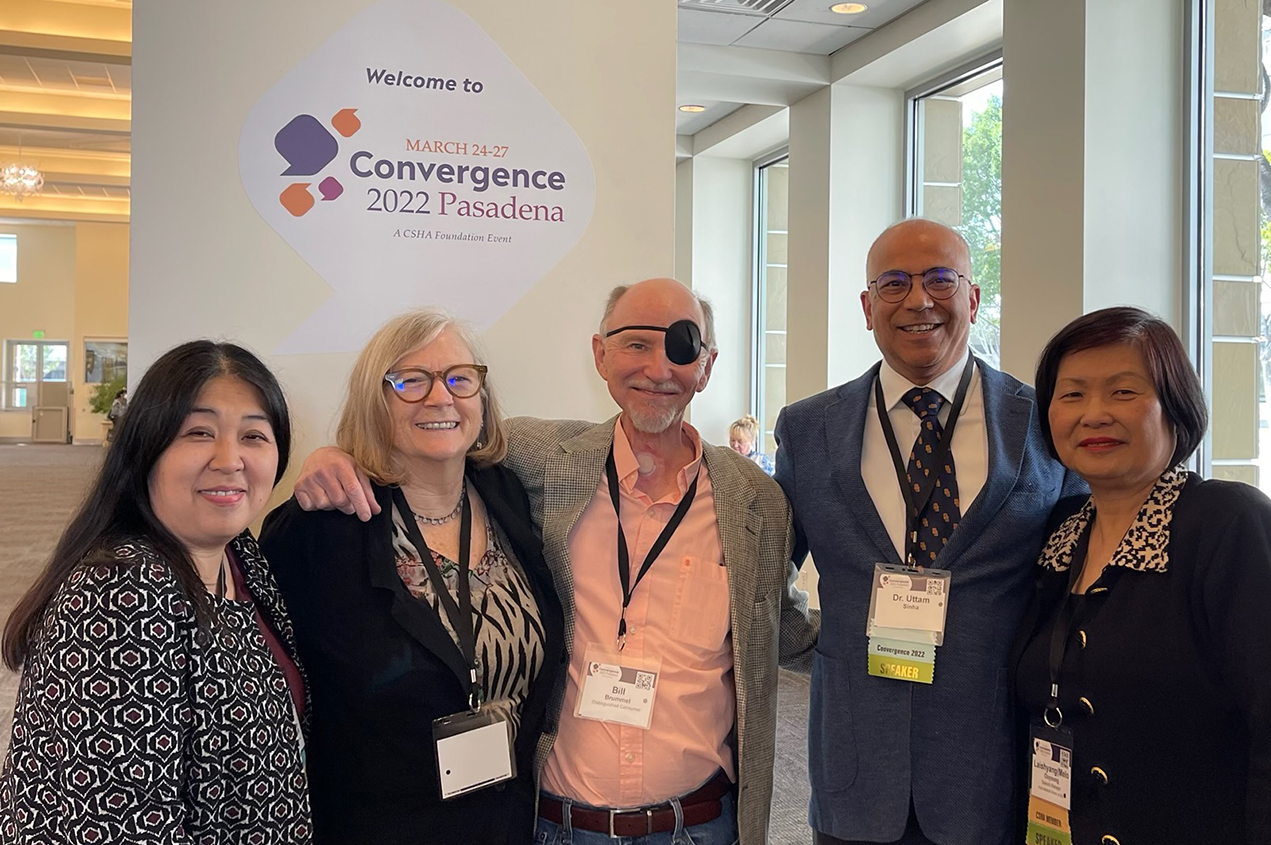In 2016, Peabody Award-winning and Emmy-nominated filmmaker Bill Brummel started having severe breathing problems. His airway, doctors found, was almost completely closed due to the long-term side effects of radiation treatment Brummel received for tonsil cancer 24 years ago.
To save his life, Uttam K. Sinha, MD, medical director of Keck Medicine of USC’s Caruso Department of Otolaryngology – Head and Neck Surgery, performed an emergency laryngectomy to remove Bill’s larynx and construct an opening in his neck, called a tracheostoma, to allow him to breathe.
The final part of the multiphase procedure was to install a tracheoesophageal voice prosthesis, also known as an artificial voice. Sinha explained that the device is a valve installed behind the stoma and attached to the esophagus, allowing the patient to speak again by covering the stoma as they exhale.
Keck Medicine speech pathologist Brenda Villegas,EdD, CCC-SLP, worked with Brummel for months to help him learn to speak again as he recovered. Three months later, he was able to count to 10 out loud for the first time since his laryngectomy.
Six years later, his journey has come full circle. On March 25, Brummel received the Distinguished Consumer Award from the California Speech and Hearing Association. The accolade recognized his ongoing work to support his fellow laryngectomy patients and his new documentary, “Can You Hear My Voice?”
“I was humbled,” said Brummel. “I know so many people in the laryngectomy community alone who are just as deserving as I am. But really, the award is a testament to all the people who lifted me up in the wake of losing my voice box.”
Recovery through art
At first, Brummel was focused on healing. But during a routine appointment seven months after his laryngectomy, Sinha suggested to his patient that he make a documentary about the psychosocial aspects of living with a laryngectomy.
The veteran documentarian liked the idea but needed a story to support it.
Brummel didn’t have to research for long before learning about laryngectomy patients in England who had come together to form the Shout at Cancer Choir. Through the many forms of adversity that often come with having had a laryngectomy, these people were finding support, healing and joy by coming together and singing.
“They’re not just sitting in a room,” Brummel said. “They do performances with professional musicians and to audiences of maybe 200 people. I thought to myself that this would be a really good way to tell the story I wanted to tell: of laryngectomy patients living productive and meaningful lives in spite of all the obstacles they face.”
Brummel reached out to the choir director, who said he would talk to the singers, and he later flew out to London to meet the ensemble in person. “By the time that ended, I really fell in love with the choir,” said Brummel.
Pandemic pivots pay off
Although “Can You Hear My Voice?” was screened and well-received at several film festivals in 2020, the COVID-19 pandemic disrupted the film’s widespread distribution efforts.
Brummel adjusted his plan by focusing almost entirely on the cancer community. He organized screenings at advocacy organizations, universities, support groups and clinical health care systems — an effort that continues today.
“We’ve done many screenings, and we have more scheduled,” said Brummel, who lives in Los Angeles with his wife, Frances Fitzgerald.
As a longtime member of NuVoices Los Angeles, the Keck Medicine sponsored support group for laryngectomy patients, Brummel attends for the emotional support he receives and to show others how much they can reclaim their quality of life after the procedure. He also volunteers with the group’s peer support team for patients and their families before surgery.
“If somebody is even thinking of having laryngectomy — or if it’s crucial they have one — we contact them one-on-one over Zoom to give them an example of someone living a fulfilling life after the procedure,” Brummel said.
Leading by example
To help drive this point home, Brummel regularly goes out without hiding his stoma behind a bandana or other kinds of clothes. The only thing covering his stoma is a heat moisture exchanger (HME), a device that helps to humidify the trachea and lungs and aids in speaking. And he doesn’t hesitate to speak to those he encounters.
“I try to live in a way that represents the laryngectomy community to people as deserving of respect as any other person,” he said. “There are so many psychosocial aspects that go into living with a laryngectomy. You sound different. You look different. We breathe through a hole in our neck.”
Through wider distribution of the film and his other efforts, the artist wants more people to take notice — but also not to linger on his differences.
Said Brummel, “I want people to recognize I have voice limitations, inquire if they are curious and then interact with me as they would any other person.”
To learn more about Brummel’s film, click here.
— Kate Faye


